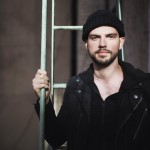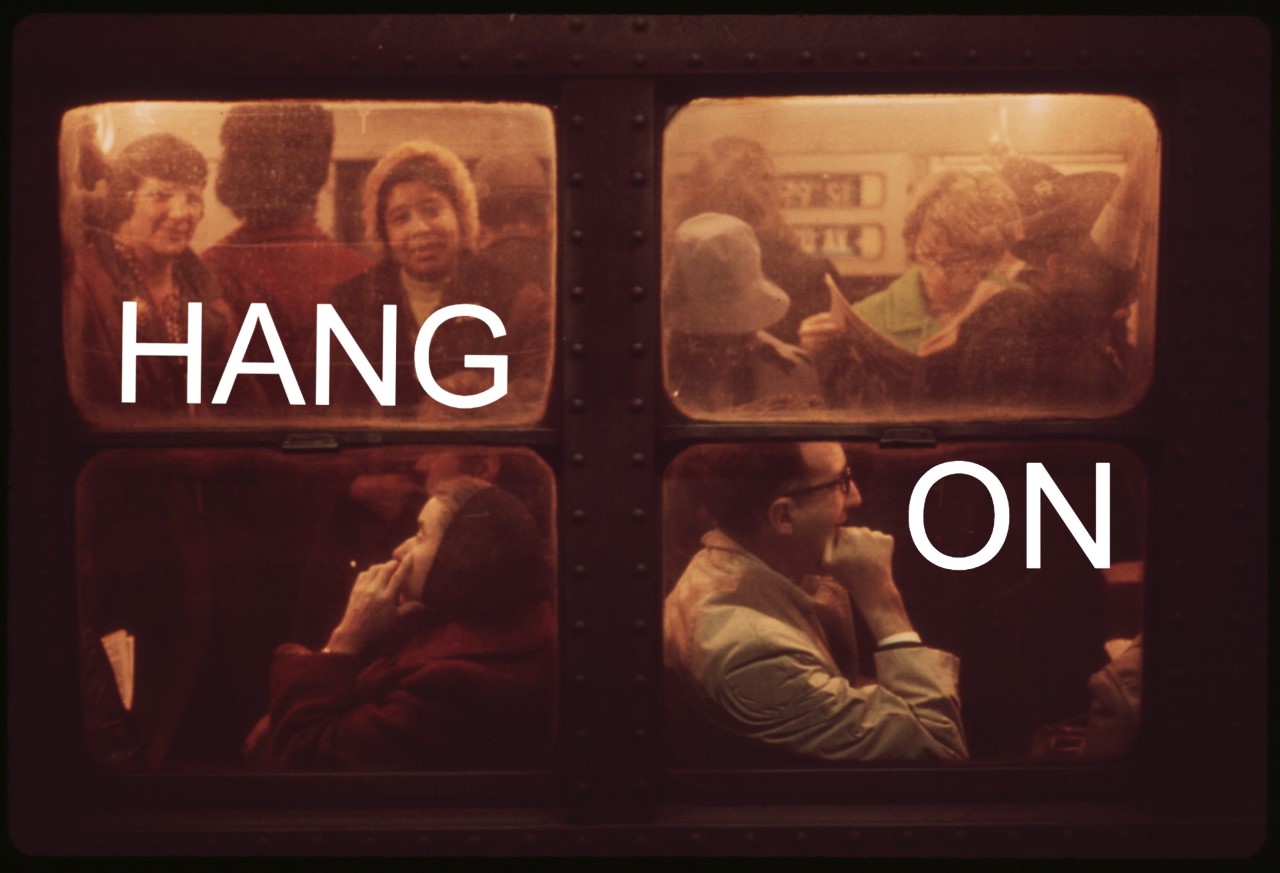Hang On is a musical investigation of the New York City subway, one of the most ambitious and controversial public works projects ever undertaken. Under the direction of Srđa Vasiljević, composer/performer Jacob Brandt leads a cast of actor-musicians in an indie-folk exploration of New York’s rapid transit system: its origins, its current state of crisis, and if there’s a light at the end of the tunnel.
Extended Play’s Susan Yassky spoke with Jacob Brandt and Srđa Vasiljević about the show, which was originally developed in the 2018-2019 R&D Group, in preparation for the concert performance at Joe’s Pub on Monday, January 6, at 7:00PM.
This interview has been lightly edited for length and clarity.
SUSAN YASSKY: Jacob, what made you want to write about the subway?
JACOB BRANDT: When I moved to the city, I started taking the subway like every day, all the time. I take the subway a lot for work as well, because when I’m not acting I’m a tutor, so I’m moving around all the time. And as I was taking the subway on a daily basis, I started thinking about it. Like, it’s really strange that we all take the subway so much and that I personally had no idea when it started, who built it, how it happened, any of those things. And I was thinking, looking around at everybody, I bet I’m not the only person who has no idea but takes this thing every day. So I started doing casual research and just reading about the subway. I found it really fascinating. That kind of set me off on this course of doing this deep dive into the history, and what I started realizing was that a lot of the ways in which the subway came about at the turn of the last century kind of lead us towards the reasons why the subway is in such bad shape now. So that’s where the whole thing came from. And then I worked on the show in R&D Group last year with Srđa, and we’ve been developing it together in that group and since. We’re really excited to do the show.
SUSAN: Why do you think it’s important or relevant to be talking about the subway right now?
SRĐA VASILJEVIĆ: We live in a space currently where we are so split on so many issues, and there are populations that just don’t see eye to eye and don’t have a chance to even witness each other in everyday life. Especially in New York City, we live in a city where the top one percent live and the very bottom of the economic ladder also exists. I think there is something really powerful about the fact that the subway system, with all the things that have gone wrong with it, still exists as a point where those two people can be on the same subway car. And if that train is delayed, they get from point A to point B at the same time. So it is this great common denominator that connects us as New Yorkers, us as human beings, us as people from varying backgrounds. With where we are in 2020, and all of these divides being found between us, it’s incredible to see that we still continue to see each other on a daily basis on this incredible marvel that was invented decades ago.
SUSAN: Are you are you optimistic or pessimistic about the future of the subway? Or neither?
JACOB: That’s a really hard question. I would say that I’m optimistic because I’m generally an optimist. But there is a massive amount of work and a massive amount of money that needs to be spent in order to make the subway operable in the way that it should be. And when I say the way that it should be, I mean something that is truly like what Srđa was saying, something that is for everyone. People think about the subway as this great public works project, and it was, but it doesn’t actually work for everyone right now, and there is a long way to go in getting to that point. But those steps are starting to be taken, and with really concerted work and the actual desire from people at the top of the food chain, with their cooperation, I think that we could see some major positive changes in the next decade or two. But it’s a long road to get there.
SUSAN: I want to pivot to talking about the creation of the show. Can you talk about the interview process?
JACOB: A lot of the initial work that was done was research-based. I did some interviewing over the course of my work with R&D, but I’ve been doing more in the recent months as we’ve been leading up to this process for Joe’s Pub. I’ve been talking to accessibility activists, and we’re going to have some of the experts that I’ve been speaking with come and talk at the show, which will be, I think, really exciting. But the process, I would say, was largely research-based to start. And it’s more recently opened up into interviews with people who are affiliated with the subway in some way or another. So I guess as far as process goes, many of the songs you’ll hear draw more on research, and then another component of the show will be lifting up voices of people who have skin in the game as far as the contemporary subway debacle goes.
SRĐA: Jumping off that, I think that the interesting thing about the subway versus most documentary topics is that it’s something that most people, specifically in New York City, have some relation to or some experience with. So a lot of the actual text of the show is pulled from interviews and found research, but it also includes things where we’ll have conversations with people on an everyday basis that inform the way that we are developing the piece and inform the stories that we want to infuse the piece with. A big thing that we’ve tried to focus on is that, like we said, the subway is this great common denominator, but who are the people that are left out of that? Who are the people that don’t have access to it? Who are the people that are disenfranchised by this system, who are the people that really are not included in this great public works project, and what does that mean for the future of the subway? How do we engage those people and how do you create a system which does include everyone?
SUSAN: Do you feel like working on this project has changed the way that you interact with the subway?
SRĐA: 100 percent. Rather than just seeing it as this, you know, logistics of how to get from point A to point B, you start realizing how this affects people, how this affects people’s livelihoods, how this affects their families, how this affects their relationships. Those are the really beautiful, human moments that pop out of the show. You start realizing that this system, which seems very hard and steel and like something that is so incredibly connected to machinery, has a lot of emotional weight and humanity that’s built into it, and that’s woven in from the very onset of building the subway in New York.
JACOB: I’ve also found that the more I understand about the way the system works, the more I think about it when I’m riding the subway, because I’ve learned what it means when there are signal problems, and other things like that. I now feel like I understand what’s at stake and what the challenges are that make our trips, you know, less than ideal. It feels like I’m riding the subway with a different set of eyes than I was two years ago.
SUSAN: Srđa, can you talk about the role directors play in the R&D Group? Are you part of the research process? Do you go to all the meetings?
SRĐA: It kind of depends on the director and their schedule and what they’re hoping to get out of the process. As a director, oftentimes you have to really fight to be in the room in terms of development. So it’s a really, I think, integral part of the program that you have a director in the room who’s not leading the process by any means, but can suggest things or ask questions or just be a voice of reassurance. And we’re a group of really well-equipped, talented, young, emerging composers, writers, directors. It’s an incredible space to be in, just because of the chemistry that we all have.
JACOB: Yeah, it’s one of my favorite things about R&D. It’s the only writers group, to my knowledge, that includes directors from the beginning of the process. Having the dramaturgical minds in the room from the start of the year is just absolutely essential to the work we do.
SUSAN: You’ve talked some about how the show has changed. Where do you want it to go next?
SRĐA: One thing that we’e exploring in this version, which will be really exciting to see, is really embracing The Civilians as the thing that brought us together and the thing that brought this piece into the world. There’s going to be live interviews that are a portion of the piece, we’re using multimedia, we’re using different visuals. We’re really creating this world that feels theatrical, where we’re using the skill set that we have, but then we’re also really embracing the documentary style and presenting a world that kind of blends what it means to be documentary and what it means to be theatrical, and then also what it means to be a concert. Because at the end of the day, Jacob has composed beautiful music with beautiful stories and beautiful narratives that are layered into the piece. So we’re doing this fine dance between these three worlds, and trying to combine it in one space.
JACOB: If we’re talking developmentally, I’m incredibly excited to do the show at Joe’s Pub because it will be an amazing litmus test to see if this kind of new genre-bending type of performance achieves what we hope it will. I’m very excited to see how this iteration plays in front of people. We will no doubt learn a ton from this process.
SUSAN: It sounds like the fact that you’re doing it in this setting has really affected the way that the show has developed. Would it have gone that way if it hadn’t been at Joe’s Pub?
JACOB: I’m not entirely sure, but I will say that I’m interested in writing, not necessarily in a site-specific way, but I’m interested in writing pieces that are for specific spaces. When we found out that we were going to do the show at Joe’s Pub, I really wanted to create an iteration of the show that felt at home there. So, I think the fact that we’re doing it at Joe’s Pub has affected the development in a way that I’m really excited about.
SRĐA: It’s such a beautiful partnership between The Civilians and Joe’s Pub, because that space has such a special chemistry and such a special energy. I think that there would almost be no way of us presenting this show at Joe’s Pub without embracing all of the lovely things that the space has to offer and all of the artists that have come before us.
SUSAN: Is there anything else that you want people to know about the show before they go?
JACOB: I’ll just say that, if you are interested in the subway to begin with, you will certainly find things in the show that you will appreciate. And if you’re not interested in the subway to begin with, I think that’s even more of a reason for you to come. I think people will be surprised about what they don’t know about the subway.
SRĐA: After seeing or being a part of the show, I feel like you will step into the subway with a new appreciation and possibly a new concern for the way that things are being handled, a new outlook on what the future of the subway looks like. It’ll definitely shift your consciousness about the way that you witness and use this thing that’s used on an everyday basis.
JACOB: And perhaps people will be inspired to get involved in the effort to make the subway for everyone.
SUSAN: Is there anything you wish I had asked you?
SRĐA: What’s your favorite subway line and why?
SUSAN: Sure.
SRĐA: I like the G train because it connects Queens and Brooklyn, and I feel like, you know what I mean, opposing boroughs is a really hard space, and I feel like once you’re going from Court Square and then you end up deep in Brooklyn, it’s like you see the population change. And I like that it doesn’t touch Manhattan at all, that it’s like its own line.
JACOB: It’s funny, I also like the G train. It’s my favorite line, for a different reason. I mean, for all of those reasons as well, but I love the G train because people complain that it doesn’t come very often, but it actually comes very consistently, and you can plan for it. It’s one of the few lines where I can plan my trips and have those trips be how I thought they were going to go. A lot of people told me don’t move off the G train. And I did. And I’m now a full G convert.
Authors
-

Susan Yassky is the Literary Associate for The Civilians and a New York City-based playwright and dramaturg. She was a Dramaturgy and Literary Management Apprentice at Actors Theatre of Louisville, where she worked on several productions in the 2019 Humana Festival of New American Plays. As a literary intern, she has worked at the Vineyard Theatre, Long Wharf Theatre and the York Theatre Company. Her plays have been developed at Actors Theatre of Louisville and Yale University. She received her B.A. in Theater Studies and Humanities from Yale in 2017. https://www.susanyassky.com
View all posts -

Jacob is a New York-based actor, composer, and musician. As an actor, he has performed regionally at Bucks County Playhouse, Weston Playhouse, Williamstown Theatre Festival, Huntington Theatre Company, Company One, New Repertory Theatre, Speakeasy Stage Company, and Wheelock Family Theatre. He has been a featured composer at NYMF, and his work as a composer/performer has been developed and performed at New York City Center, Ars Nova, Ensemble Studio Theater, Chinatown Soup, Fresh Ground Pepper, the Exponential Festival, The Tank, and the Motor Company. Jacob's actor-musician show "1969: The Second Man" premiered at New York Theatre Workshop as part of their Next Door Series. He is an alum of The Civilians R&D group, and a graduate of Harvard College, where he studied acting and playwriting.
View all posts -

Srđa Vasiljević is a Bosnian-American director and the resident director of Theatre for One. He has developed new and revived works with companies such as New Dramatists, La MaMa and Ford's Theatre. Recent Projects include "LatinXoxo" (Joe’s Pub), "Gradiva Who Walked Through Hell and Back" (Mad. Sq. Art & T41), "Independence" (Alchemical Theatre Lab), "Dust Can't Kill Me" (NYMF & LPR) and "When I Started Dating Men" (Dixon Place). Srđa currently works as the Experiential Director of Adam Aleksander Presents. Member of The Civilians R&D Group, ENCORES! Off-Center Artists' Board, Lincoln Center Directors' Lab and an inaugural member of the Directors Lab Mediterranean. Upcoming: "Me Alone with No Friends" by Joe Castle Baker at ArsNova. www.sr-da.com
View all posts









